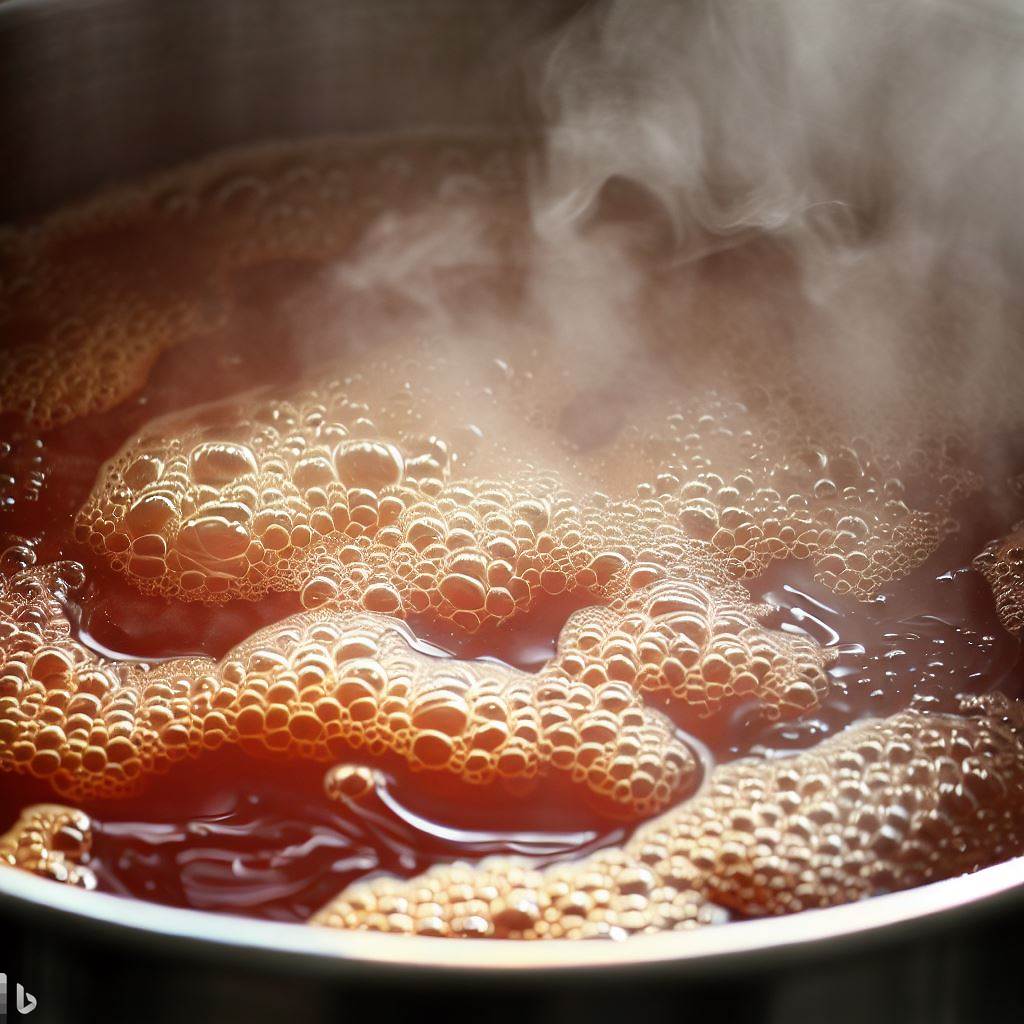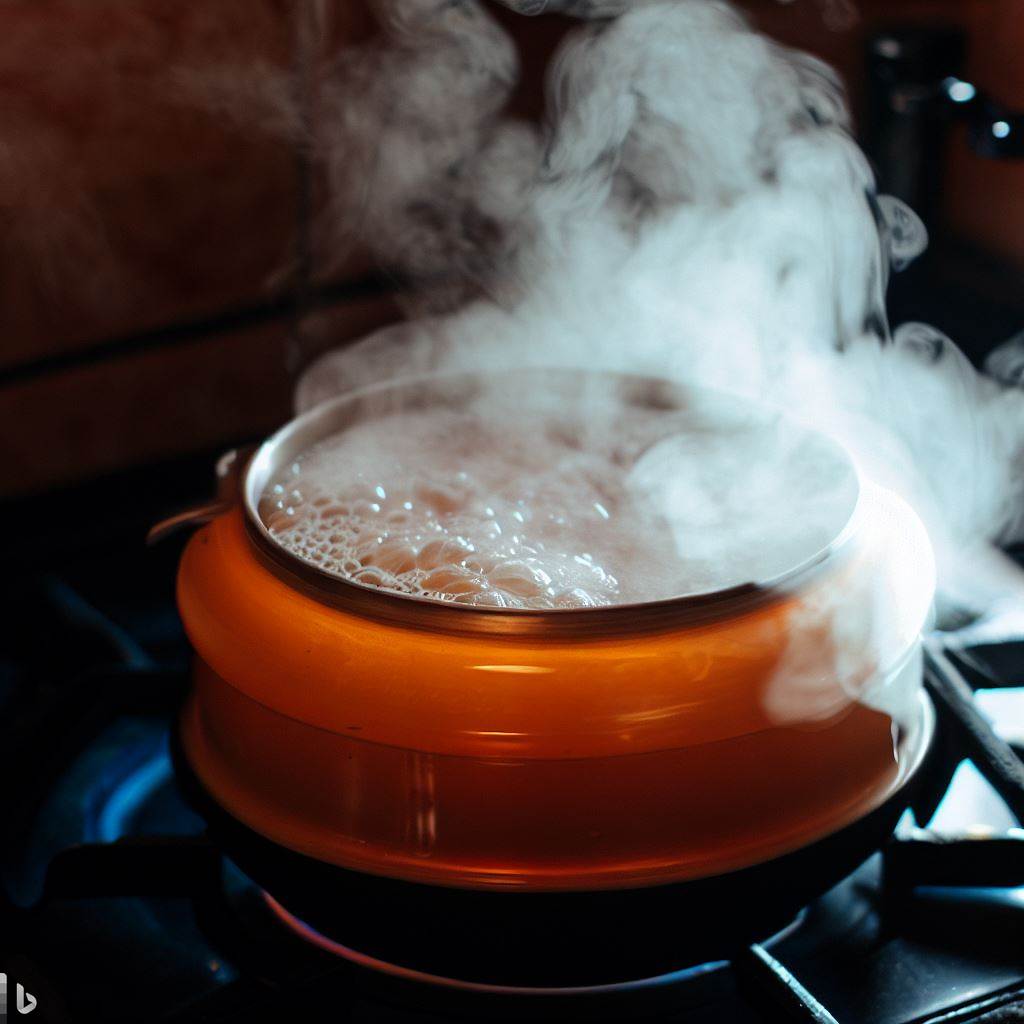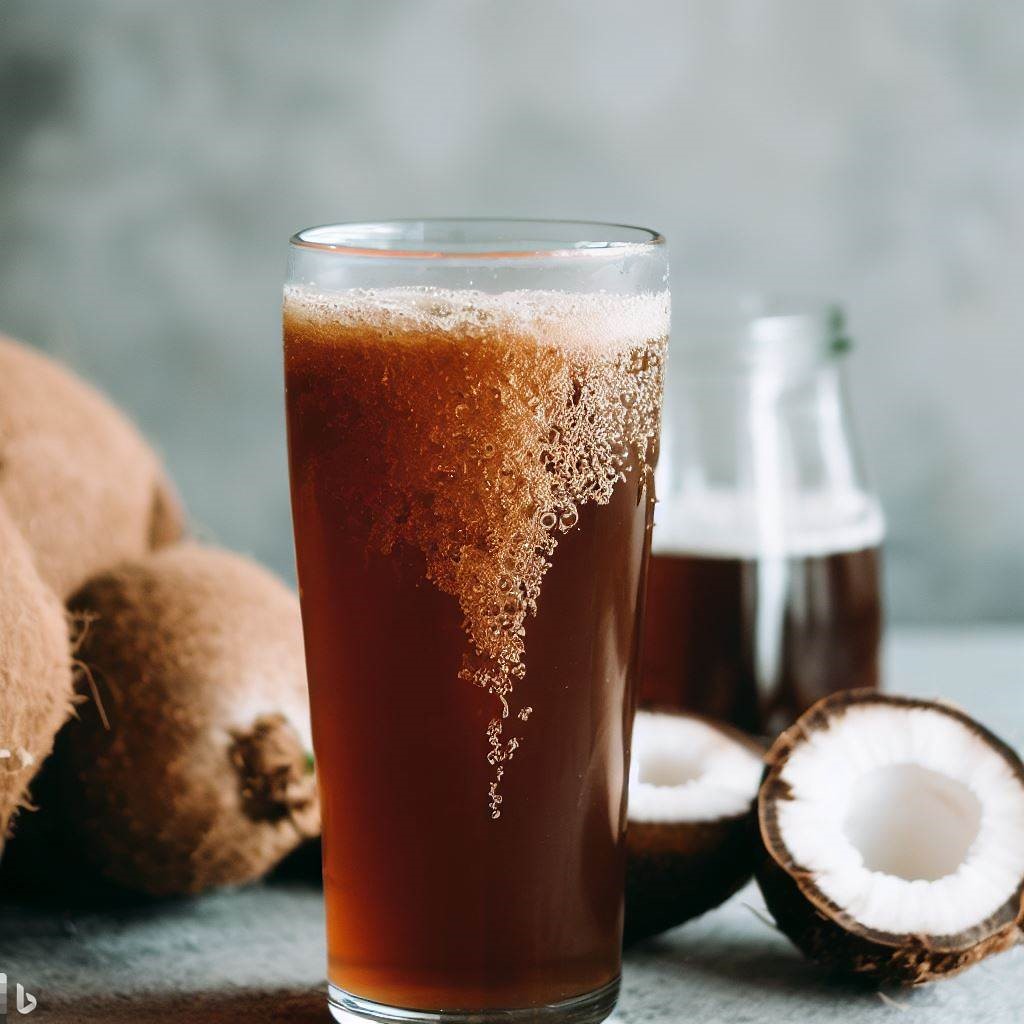While homebrewing kombucha allows for creative experimentation, there is a debate about whether or not to pasteurize the final product. In this blog post, we will explore the pros and cons of pasteurization and discuss the factors that can influence your decision. Lets dive into the topic of Should you Pasteurize Kombucha?
Should You Pasteurize Kombucha When Brewing at Home?

A. Pros of Pasteurization
- Safety concerns addressed: Pasteurization involves heating the kombucha to kill potentially harmful bacteria and yeast. This process eliminates the risk of consuming contaminated or spoiled kombucha, especially for individuals with compromised immune systems.
- Extended shelf life: Pasteurized kombucha has a longer shelf life compared to its unpasteurized counterpart. The heating process kills most of the live microorganisms, preventing further fermentation and maintaining the beverage’s flavor and carbonation for an extended period.
- Consistency in flavor and carbonation: Pasteurization helps preserve the desired flavor and carbonation levels of kombucha, ensuring a more consistent taste with each batch. This can be beneficial for those who prefer a standardized product.
- Reduction of potential contamination risks: By pasteurizing the kombucha, any remaining yeast and bacteria are effectively neutralized, minimizing the risk of secondary fermentation or contamination during storage.
B. Cons f Pasteurization
- Loss of beneficial bacteria and enzymes: Pasteurization not only kills harmful microorganisms but also destroys beneficial bacteria and enzymes present in the kombucha. These beneficial components play a role in gut health and overall well-being.
- Altered taste and texture: The heating process can impact the flavor and texture of kombucha. Pasteurized kombucha may taste slightly different from the raw version, with some people perceiving it as less vibrant or lively.
- Limited experimentation with flavor profiles: Pasteurization restricts the ability to experiment with flavor profiles in kombucha. The high heat can alter or diminish the nuances of certain ingredients or additions, limiting the range of flavors that can be achieved.
- Potential negative impact on the SCOBY: The SCOBY, the living culture responsible for fermenting kombucha, may be adversely affected by the pasteurization process. High temperatures can weaken the SCOBY’s vitality and potentially impact its ability to ferment future batches.
The Pasteurization Process

A. Overview of pasteurization methods
There are several methods to pasteurize kombucha, each with its own advantages and considerations. The most common approach is heat pasteurization, but there are also non-heat alternatives like UV light treatment, pressure pasteurization, and filtration techniques.
B. Heat pasteurization
- Process and temperature considerations: Heat pasteurization typically involves heating the kombucha to a specific temperature range for a set duration. The precise temperature and time can vary although we reccomend around 160–180 degrees farenheight, but it is crucial to strike a balance between eliminating harmful microorganisms and preserving the desired qualities of the beverage.
- Impact on kombucha quality and microbial load: Heat pasteurization reduces the microbial load in kombucha, making it safer to consume. However, excessive heat or prolonged exposure can result in undesirable changes to the taste, texture, and beneficial components of the beverage. So, you only want to pasteurize for 15 or so minutes at most at peak temp.
- Ensuring proper pasteurization without overcooking: Careful monitoring of the temperature and duration is necessary to achieve effective pasteurization without overcooking the kombucha. This helps maintain a balance between safety and preserving the desirable characteristics of the beverage.
Understanding Heat Pasteurization
Heat pasteurization involves subjecting kombucha to a specific temperature range to eliminate potentially harmful bacteria, yeasts, and molds. This process helps extend the shelf life of kombucha and makes it safe for consumption. It is crucial to maintain the delicate balance of live cultures and flavors during heat pasteurization.
Equipment Required for Heat Pasteurization

Before diving into the heat pasteurization process, it’s important to gather the necessary equipment. Here’s a list of what you’ll need:
Heat Source – Stove or Sous Vide
To heat pasteurize kombucha, you’ll require a heat source capable of maintaining a precise temperature range. A stovetop, hot plate, or sous vide machine can be used for this purpose. Choose a method that suits your preferences and ensures accurate temperature control.
Stainless Steel Pot or Sous Vide Container
A stainless steel pot or sous vide container is essential for heating the kombucha. Make sure the container is large enough to hold your batch of kombucha with some headspace to prevent spills during the heating process.
Thermometer
A reliable electronic thermometer is crucial to monitor the temperature of the kombucha accurately. Choose a high-quality digital or analog thermometer that provides accurate readings within the desired temperature range.
Bottles or Jars
You’ll need clean glass bottles or jars with airtight lids for storing the pasteurized kombucha. Ensure they are sterilized before use to maintain the integrity of the product.
Timer
A timer is a handy tool for keeping track of the heat pasteurization process. You can use a kitchen timer or the timer function on your smartphone.
3. Steps for Heat Pasteurization
Now that you have the necessary equipment, let’s dive into the step-by-step process of heat pasteurization:
1. Prepare the Kombucha
Start by preparing your kombucha for heat pasteurization. Make sure your batch has undergone primary fermentation and is ready for the next step. It should have the desired level of tartness and carbonation.
2. Transfer Kombucha to a Heat-Resistant Container
Carefully transfer the kombucha from its fermentation vessel to a heat-resistant container, such as a stainless steel pot or sous vide bag. Ensure the container is clean and sanitized to maintain the quality of the kombucha.
3. Heat the Kombucha
Place the heat-resistant container with the kombucha on the heat source. Gradually increase the temperature to the desired range, typically between 160°F (71°C) and 180°F (82°C). Avoid rapid temperature changes, as they can negatively affect the flavors and live cultures in the kombucha.
4. Maintain the Temperature
Once the kombucha reaches the desired temperature, maintain it within the specified range for a specific duration. The recommended time for heat pasteurization is generally around 10 to 15 minutes. However, different recipes and preferences may require slight adjustments to the duration.
5. Cool the Pasteurized Kombucha
After the required pasteurization time, remove the heat source and allow the pasteurized kombucha to cool naturally. Avoid rapid cooling methods, as they may cause breakage or spoilage of the bottles. Let the kombucha cool to room temperature before proceeding to the next step.
6. Bottle and Store
Once the kombucha has cooled, carefully transfer it to sterilized glass bottles or jars. Seal the containers tightly to maintain carbonation and prevent contamination. Store the pasteurized kombucha in a cool, dark place away from direct sunlight
C. Non-heat pasteurization alternatives
- UV light treatment: UV light can be used to kill microorganisms without subjecting the kombucha to high temperatures. However, UV light pasteurization is less common in homebrewing setups and often requires specialized equipment.
- Pressure pasteurization: Applying pressure to kombucha can also effectively eliminate harmful microorganisms. This method allows for pasteurization without significant heat, minimizing the impact on taste and texture.
- Filtration techniques: Filtration using fine mesh or specific membranes can physically remove microorganisms from kombucha, achieving a similar result to pasteurization. However, it is essential to use proper filtration techniques and equipment to ensure effective removal of harmful contaminants.
Factors Influencing the Decision
When deciding whether to pasteurize kombucha when brewing at home, several factors should be taken into consideration:

A. Brewing environment and hygiene practices
The cleanliness of your brewing environment and adherence to proper hygiene practices significantly impact the risk of contamination. Maintaining a sanitary setup and following good brewing practices can help reduce the need for pasteurization.
B. Personal health considerations
Individuals with compromised immune systems or specific health conditions may be more susceptible to the risks associated with consuming unpasteurized kombucha. In such cases, pasteurization is recommended to minimize potential health hazards.
C. Shelf life and storage preferences
If you prefer a longer shelf life for your kombucha or plan to store it for an extended period, pasteurization can help maintain its quality and prevent further fermentation. Pasteurized kombucha has a more stable flavor and carbonation profile over time.
D. Intended consumption audience
Consider the preferences and needs of the people who will be consuming the kombucha. If you are brewing kombucha for a wider audience or intending to sell it, pasteurization may be necessary to ensure safety and consistency.
Brewing Kombucha without Pasteurization
A. Benefits of raw, unpasteurized kombucha
- Rich probiotic content: Raw kombucha contains a diverse range of beneficial bacteria and yeast that contribute to its probiotic properties. These live microorganisms can support gut health and enhance the immune system.
- Unique flavor profiles: Unpasteurized kombucha allows for greater experimentation with flavors and ingredients. The fermentation process continues in the bottle, resulting in evolving flavors and the possibility of creating complex and unique taste experiences.
- Cultural and historical significance: Traditional methods of brewing kombucha involve fermentation without pasteurization. Some kombucha enthusiasts appreciate the authenticity and historical context of brewing raw kombucha.
B. Ensuring safety and quality in raw kombucha brewing
- Hygiene protocols: Maintaining a clean brewing environment and practicing good hygiene throughout the brewing process is crucial when brewing raw kombucha. This helps minimize the risk of contamination and ensures the safety of the final product.
- Monitoring pH and fermentation time: Regularly testing the pH of the kombucha and monitoring the fermentation time is essential when brewing raw kombucha. These parameters can indicate the progress of fermentation and help prevent the growth of harmful microorganisms.
- Storing and handling kombucha safely: Proper storage conditions, such as refrigeration, can help slow down the fermentation process and maintain the quality and safety of raw kombucha. Additionally, handling the bottles carefully to prevent breakage or accidental contamination is important.
Final Thoughts on Should you Pasteurize Kombucha?
In conclusion, the decision to pasteurize kombucha when brewing at home is influenced by various factors. Pasteurization offers benefits such as improved safety, extended shelf life, and consistency in flavor and carbonation. However, it comes with the drawback of losing beneficial bacteria and altering taste and texture. Ultimately, the choice between pasteurization and brewing raw kombucha depends on personal preferences, health considerations, and the desired brewing experience.
FAQ – on Should you Pasteurize Kombucha

- Is it necessary to pasteurize kombucha to avoid the risk of harmful bacteria?While pasteurization helps eliminate harmful bacteria, the need for it depends on factors such as brewing hygiene, personal health considerations, and the intended audience. With proper brewing practices, the risk of harmful bacteria can be minimized even without pasteurization.
- Can pasteurized kombucha still have health benefits?Pasteurization does eliminate most live microorganisms, including beneficial bacteria and yeast. As a result, pasteurized kombucha may have reduced probiotic content compared to raw kombucha. However, it still contains other nutrients and can be part of a healthy diet.
- How does pasteurization affect the taste of kombucha?Pasteurization can alter the taste of kombucha, making it slightly different from the raw version. Some individuals may perceive pasteurized kombucha as less vibrant or lively. However, the impact on taste can vary depending on the pasteurization method and duration.
- Can I experiment with different flavors in pasteurized kombucha?Pasteurization can limit experimentation with flavor profiles compared to raw kombucha. The high heat involved may affect the nuances of certain ingredients or additions. However, there are still opportunities to explore different flavors within the parameters of pasteurization.
- What is the role of the SCOBY in pasteurized kombucha?The SCOBY plays a similar role in pasteurized kombucha as it does in raw kombucha. It initiates fermentation and contributes to the flavor, carbonation, and overall character of the beverage.
Thanks for visiting Greek Mountain Kombucha and our blog post on: Should you Pasteurize Kombucha? Read more articles below!
- Homemade Kombucha a Comprehsneive Guide
- Free eBook on Kombucha Brewing
- Shop at GMK to Purchase Supplies







